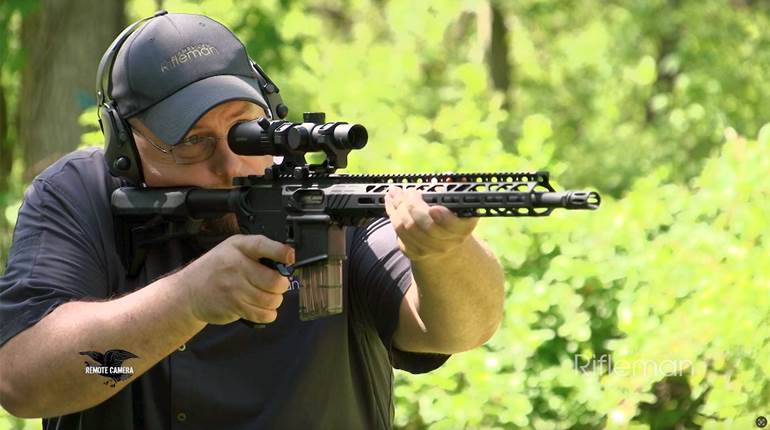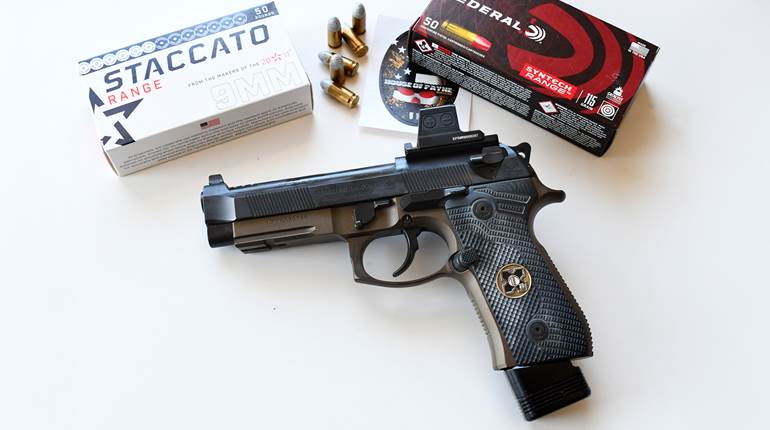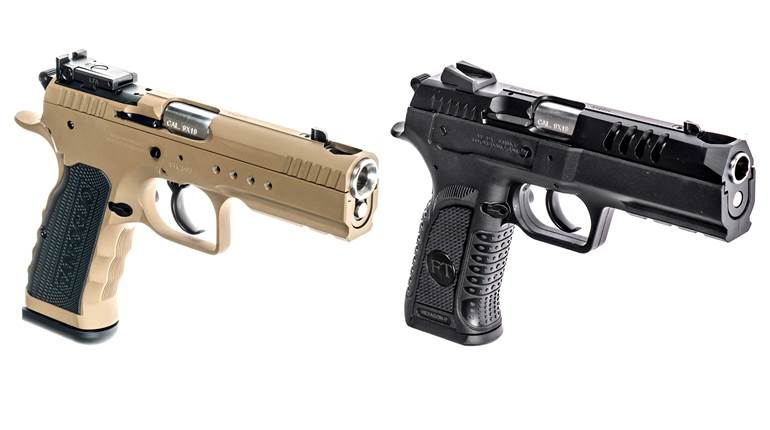
It’s ironic that, until recently, one of the quintessential American firearm actions also happened to be one of the least exploited by the U.S. firearm industry. The lever-action is not a new notion, a fact outlined by Smith & Wesson in its release of the Model 1854, so-named for the year that Horace Smith and Daniel Wesson built a company around their Volcanic Repeating Rifle, a design that dated to the 1840s. Despite their best efforts, however, the Volcanic was a failure. Smith & Wesson went on to do bigger things, while Oliver Winchester bought the Volcanic company and its assets and directed his shop foreman, Benjamin Tyler Henry, to “make this fool gun work.” Of course, he did, and the rest, as they say, is history.
Though that’s not quite the whole story, because as recent firearm industry trade shows have illustrated, there’s a lot of growth left in what’s already a legacy action. Until recent years, “evolution” in the lever-action world was something that largely occurred in the late 19th century or early 20th century. Prior to the recent slate of new releases, one of the “newest” designs on the market was the Marlin 336, first seen in 1948 and largely based on the Model 1893 design from the same company. For decades after that, the lever-action was seen as traditional, something that wasn’t messed with, even into the days when the AR-15 became king of the commercial rifle world.
Today, there are nearly 30 million AR-style rifles on the market, and without doubt, the features that come with such guns have set consumer expectations, if not an outright standard. Inevitably, lever-action designs emerged that provided some of the flexibility of ARs in terms of accessory attachments and optics mounting—but most of these guns weren’t “new” at all. In the old Remington Outdoor days, Marlin lured consumers toward its lever guns by showcasing “tactical” lever-actions, featuring skeletonized buttstocks, M-Lok handguards, large-loop levers and lengthy optics rails. But there were two problems with these offerings. One, most of these guns were custom designs, as in they were literally available only through the Remington Custom Shop. Two, despite their appearance, they were still the same 19th century designs at their core. It was something akin to dressing grandma in goth clothing. You get the idea, but it’s just not right.
Over the past few years, though, we’ve seen the beginnings of a new chapter in the lever-gun world. Not only have more companies come out with “blacked-out” production versions of classic guns, we’ve also seen genuinely new options emerge. Within the market of “tactical lever-actions,” several designs stand out. The FightLite Herring Model 2024 is one of them, mating a mostly standard AR-15 upper with a specially designed lower that accommodates AR-compatible STANAG magazines. A similar design has also been released from Bond Arms, which has recently obtained a patent on the concept. That company’s LVRB uses an asymmetric camming mechanism within its lower receiver to shorten the throw required to cycle the bolt, allowing the rifle to be operated quickly, while accommodating longer STANAG magazines that don’t interfere with the lever’s arc of travel. Additionally, the lever incorporates a built-in grip safety; the shooter’s strong hand must fully grip the lever at the stock wrist in order for the action to be fully closed and locked and therefore prevent an out-of-battery firing.
The LVRB also promises full compatibility with standard AR-15 upper receivers, bringing a new level of versatility to the time-honored lever-action system. As of this writing, Bond Arms was still tweaking the design, notably trying to round out the internal cam path to provide for a smoother arc of travel for the lever, but company owner and president Gordon Bond said he intends to be in production by the end of summer. Yet another AR-style lever-action rifle comes from AR-15 manufacturer Bear Creek Arsenal, which announced its Huntmaster MLAR at SHOT Show 2024. Unlike the Herring and the Bond, the MLAR doesn’t directly accept all AR-15 upper receivers, but certain parts can be swapped out to enable cartridge interchangeability. Notably, the bolt (not the bolt carrier) can be swapped for all standard AR-15 bolts, and standard AR-15 barrels can be mated to the upper receiver. One benefit unique to the BCA design, though, is full compatibility with all drop-in AR-15/AR-10 triggers.
These three designs, the Bear Creek MLAR, Bond LVRB and FightLite Herring Model 2024, are notable in that they are the first true AR-style lever-actions seen in the market, and with them come some benefits above more traditionally constructed lever-action designs. Aside from the obvious accessory compatibility and parts interchangeability, the magazine-fed design overcomes one of the biggest obstacles in “lever evolution” preventing the “lever revolution.” Traditionally, lever-actions have been fed by under-barrel tubes featuring a row of cartridges stacked end to end, and this is limiting in several ways.
Obviously, overall capacity is diminished and directly correlates to the length of the barrel and the cartridge. Less obviously, though, is that chambering and bullet design are restricted to prevent spitzer-style projectiles from acting as de-facto firing pins for the round ahead of them under heavy recoil. No less a man than John Moses Browning approached this problem at the end of the 19th century, designing the Winchester Model 1895 as a solution, using a four-round internal box for spitzer-style cartridges. But as increasingly more capacious double-stack box magazines and, eventually, detachable box magazines entered mainstream use, the lever-action languished. The development of actions able to accept standard-capacity AR-15 magazines is one of the first significant technological advancements for the lever-action in more than a century.
 While BCA, Bond Arms and FightLite Industries have slanted heavily toward AR styling and compatibility with their designs, other makers have tended toward a balance between innovation and tradition. The new Lever Action Supreme Rifle (LASR) from Henry Repeating Arms follows somewhat traditional lines in its stock, receiver and fore-end, but it makes use of standard AR-15 magazines, as well as an AR-esque rotating bolt. Then there are manufacturers who went in different directions with all-new designs or updated legacy platforms.
While BCA, Bond Arms and FightLite Industries have slanted heavily toward AR styling and compatibility with their designs, other makers have tended toward a balance between innovation and tradition. The new Lever Action Supreme Rifle (LASR) from Henry Repeating Arms follows somewhat traditional lines in its stock, receiver and fore-end, but it makes use of standard AR-15 magazines, as well as an AR-esque rotating bolt. Then there are manufacturers who went in different directions with all-new designs or updated legacy platforms.
Of course, the Winchester 1873 and several subsequent lever-action platforms were, in a way, the original “pistol-caliber carbines.” The Volcanic, with its Rocket Ball cartridge, was infamously underpowered, and the inherently weak design of early lever-action operating mechanisms meant the guns were only suitable for handgun cartridges. While firearm design and action strength have come a long way since then, several makers have adhered to the original pistol-caliber concept.
In 2023, POF-USA released its Tombstone, which was a radical take built with a somewhat-blocky aluminum receiver that makes use of a camming linkage enabling a short throw. Not that the throw needs to be particularly long, given the squat dimensions of the 9 mm Luger cartridge for which the gun is chambered. But the short throw makes it easy to accommodate the 20-round detachable box magazine, a proprietary design that’s somewhat like that of the CZ Scorpion. POF-USA called this the “first-ever 9 mm production lever-action.” Until 2024, it was the only one, but Taylor’s & Co. came out this year with a made-in-USA option in its TC73.
 Taylor’s is no stranger to the lever-action concept, having been an importer for Italian-made clones of classic lever-action designs, but the TC73 changes the dynamic in more ways than just in being made stateside. Rather than sticking with a classic chambering, Taylor’s Model 1873-inspired design updated the concept by offering this classically styled option in 9 mm Luger. Some may view it as sacrilege, but a notable benefit of original lever-action designs was easy cartridge interchangeability with a cowboy’s or lawman’s sidearm. These days, 9 mm Luger is unquestionably the king of the handgun-cartridge world. As an added benefit, the TC73 also comes with a threaded muzzle, enabling the use of suppressors, which are not only growing more accessible in the wake of multi-week, or even multi-day, Form 4 approvals by ATF but are also hugely effective on lever-action platforms, since their manually operated, locked-breech actions don’t experience the excessive bolt noise or blowback associated with suppressor use on semi-automatic rifles.
Taylor’s is no stranger to the lever-action concept, having been an importer for Italian-made clones of classic lever-action designs, but the TC73 changes the dynamic in more ways than just in being made stateside. Rather than sticking with a classic chambering, Taylor’s Model 1873-inspired design updated the concept by offering this classically styled option in 9 mm Luger. Some may view it as sacrilege, but a notable benefit of original lever-action designs was easy cartridge interchangeability with a cowboy’s or lawman’s sidearm. These days, 9 mm Luger is unquestionably the king of the handgun-cartridge world. As an added benefit, the TC73 also comes with a threaded muzzle, enabling the use of suppressors, which are not only growing more accessible in the wake of multi-week, or even multi-day, Form 4 approvals by ATF but are also hugely effective on lever-action platforms, since their manually operated, locked-breech actions don’t experience the excessive bolt noise or blowback associated with suppressor use on semi-automatic rifles.
Ruger, which famously took ownership of the struggling Marlin brand following Remington’s bankruptcy, is leaning toward tactical with the revived and reworked Marlin Dark Series, which will be available in three models, each based on the Marlin 1895, 336 and 1894 actions, respectively. The newest example of the former, the Trapper Series Model 1895, features new Magpul ELG furniture with M-Lok slots on the fore-end and length-of-pull adjustment spacers for the buttstock.
Rossi USA revamped its R95 line with new Triple Black and Stainless models in .30-30 Win., along with a Rio Bravo Tactical model chambered in .22 Long Rifle. Winchester joined the rimfire crowd with its .22 LR-chambered Ranger, which is decidedly traditional in appearance but has a takedown mechanism that allows it to be stored compactly and is also highly affordable. Uberti USA added a modernized Model 1873 to its lineup with a forward-mounted Picatinny optics rail.
Aero Precision has developed its own Marlin 1895-inspired lever-action rifle, a prototype model of which could be seen at SHOT Show this year, complete with a monolithic M-Lok M1895-compatible handguard, a full-length Picatinny optics rail and a fully adjustable, skeletonized, M1895-compatible buttstock. Sister company Stag Arms also had a more traditionally styled lever-action rifle aimed at the hunting crowd, though with its own updates. Then there was the aforementioned Model 1854, which uses a traditional action in stainless steel with an external hammer, large-loop lever, right-side loading gate and tube magazine. A blacked-out set of polymer furniture that includes built-in M-Lok attachment points at the front, along with a section of rail atop the receiver and built-in open sights, tips the S&W design into “practical-tactical” territory.
Until now, all we’ve talked about are just the guns. A comprehensive look at newly available and compatible accessories for extant and emerging lever-actions would fill the rest of this magazine. All of which raises the question of why. Why now? In introducing its Dark Series at the end of 2023, Ruger President and CEO Chris Killoy remarked on the trend.
“There is a growing demand for more modern lever rifles, and the previous Dark Series rifles introduced Marlin into this space,” Killoy said. “We took a hard look at them and made several significant improvements.”
From a simple commercial standpoint, it could just be that it’s unexplored territory. Functionally every other corner of the firearm market is replete, some might say oversaturated, with every kind of possible option. Want a handgun? There are literally thousands. In rifles, self-loading and bolt-action designs abound. Shotguns? If you can think of it, an option probably exists. Not so for the lever-action rifle, which for most of its life, has adhered to pretty similar feature sets. Perhaps companies see opportunity.
What about the political angle? NRA has garnered a number of victories in recent decades that have further reinforced the people’s right to keep and bear arms, but despite those wins, there are still corners of our country where folks are deprived of the ability to own AR-15-style semi-automatic rifles and standard-capacity magazines. Lever-actions, though, are accessible in these areas and, while it’s not semi-automatic-quick, working a lever can be pretty darn fast, giving folks the chance to get back on target with a rapid follow-up shot.
Then there’s the consumer-driven angle alluded to by Killoy. Smart companies follow consumers, and consumers have made it clear that these are the kinds of guns they want. Why? Maybe it’s as simple as a yearning for something different. Maybe consumers now expect to have the same kind of versatility in every platform as they have in the AR-15. Maybe it just looks cool. The beautiful truth outlined by the Second Amendment is that nobody needs a reason. You can just have it. Regardless, in an industry where technological evolution can be glacial in its pace, it’s refreshing to see advances, and 2024 certainly looks to be a mile marker for the lever-action.




































